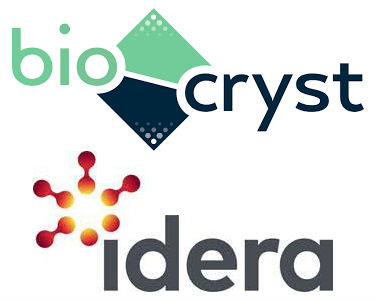
BioCryst to Merge with Idera
 Durham-based BioCryst Pharmaceuticals has signed a definitive merger agreement with Idera Pharmaceuticals.
Durham-based BioCryst Pharmaceuticals has signed a definitive merger agreement with Idera Pharmaceuticals.
The two publicly traded companies announced they will form a new company – to be named upon the deal’s closing – focused on developing medicines for treating rare diseases. The combined company will be headquartered in Exton, Pa., at the current Idera headquarters, with a consolidated research center in Birmingham, Ala.
The combination will create a “well-funded company with a diversified late-stage clinical pipeline, a proven rare disease commercial track record, and validated scientific and clinical acumen,” the companies said in a news release.
Leadership plans announced
Vincent Milano, CEO of Idera, will lead the combined company and serve on its board. BioCryst Chairman Robert Ingram will be chairman of the board, and BioCryst CEO Jon Stonehouse will serve on the board.
“By merging our unique talents, experiences and assets, we instantly strengthen our ability to become a significant force for patients suffering from a broad range of rare diseases,” Milano said in a news release. “We will also gain operational synergies and strengthen our financial position.”
The combined company will have a net cash balance of about $243 million.
The merger will form “a substantial and differentiated biotech company serving patients in the rare disease community,” Stonehouse said. “Combining our respective pipelines, infrastructures and financial resources should enable the new company to grow faster, deliver for patients more rapidly and ultimately create sustainable shareholder value well beyond what either would achieve separately.”
Developing four late-stage drugs
Milano said the new company will have a “robust” late-stage pipeline with two Phase 3 drug candidates and two Phase 2 candidates and a “deep early-stage pipeline that will continue to expand.” The company will develop four late-stage drugs:
- BCX7353, a Phase 3 drug for the prophylactic treatment of hereditary angioedema in a capsule formulation with FDA orphan drug designation
- IMO-2125, a Phase 3 drug for treating PD1-refractory melanoma in combination with ipilimumab with FDA orphan drug designation
- IMO-8400, a Phase 2 drug for dermatomyositis
- BCX7353, a Phase 2 drug for the acute treatment of hereditary angioedema in a liquid formulation.
The merger agreement has been approved unanimously by the boards of directors of both companies. The transaction, subject to stockholder approval and regulatory acceptance, is expected to be completed by the end of the second quarter of 2018.
BioCryst stockholders will own 51.6 percent of the stock of the combined company, and Idera stockholders will own 48.4 percent. Each share of BioCryst common stock will be exchanged for 0.50 shares of the new company stock, and each share of Idera common stock will be exchanged for 0.20 shares of the new company stock.
BioCryst, founded in 1986, designs and develops novel small molecule drugs that block key enzymes involved in rare diseases. Its first approved product is RAPIVAB, a viral neuraminidase inhibitor for treating influenza.
Plans for BioCryst employees not disclosed
The company has about 80 employees at its headquarters in Durham and at its R&D center in Birmingham, Ala. Their future status with the new company was not addressed in the merger announcement. A BioCryst representative said later that the headquarters for the new company "will be consolidated over time at the current Idera headquarters in Exton, Pa., and we will centralize our combined research center in Birmingham, Ala."
Idera’s lead development program is focused on priming the immune system to play a more powerful role in fighting cancer, ultimately increasing the number of people who can benefit from immunotherapy.
The companies said combining BioCryst’s small-molecule platform with Idera’s strength in nucleic acid and oligonucleotide chemistry “may create more effective and potent treatments for rare diseases.”
